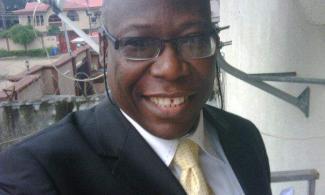
For some political reasons, some may dismiss Obasanjo’s move as self-serving but l applaud the move by Obasanjo, which ordinarily ought to have been made by the Federal government.
The letter written by former president Olusegun Obasanjo to the Chief Clerk of Old Bailey court, London, pleading for mercy for convicted Senator Ike Ekweremandu, has elicited mixed reactions.
For some political reasons, some may dismiss Obasanjo’s move as self-serving but l applaud the move by Obasanjo, which ordinarily ought to have been made by the Federal government.
Yes, the Senator committed a criminal offence in Britain for which he has been convicted, waiting for sentencing, but the reality is that, if an American Senator were to be facing trial outside the shores of America, the US government would not fold its hands, irrespective of the alleged crime. Same thing with Britain and l would give an example in which l was an eyewitness. Apart from monitoring proceedings, l actually assigned a junior reporter, Onochie Anibeze to cover the case and he did excellently well. Onochie is now the Editor of Saturday Vanguard and I’m so proud of him.
On May 19, 1984, two British aircraft engineers, Kenneth Clark (39) and Angus Patterson (41) were arrested for stealing an aircraft, a Hawker-Siddley 125 aircraft.
The Investigating police officer was Abubakar Tsav, who retired as a police commissioner (now deceased).
The plane was leased by a Nigerian, Prince Morrison Olori. Apparently, there was a disagreement over the lease agreement and the owners of the aircraft decided to recover it. Two British pilots were sent in to fly the aircraft out of Nigeria without clearance.
Then, they had a stopover at Abidjan for refuelling. The Buhari military junta managed to intercept the aircraft at Abidjan but the pilots managed to fly out of Abidjan.
So, Clark and Patterson who serviced the aircraft before departing Nigeria were arrested and charged as accomplices. They were charged before Justice Waidi Ajao-Oshodi, sitting at Ikeja High Court.
Eventually, on October 7, 1985, they were sentenced to 14 years in prison.
During the trial, the British government did not relent in interceding for the two men. As a matter of fact, on September 10, 1985, the British Foreign Secretary, Sir Geoffrey Howe, visited Lagos in respect of the trial.
Eventually, the two convicts did not complete their sentences in Nigeria. There was a diplomatic intervention to get them to continue their sentences in Britain, a euphemism for release.
So, therefore, l don’t see what’s wrong with Obasanjo’s plea. Whether that would have a mitigating effect on the sentencing is yet to be seen till May 3.